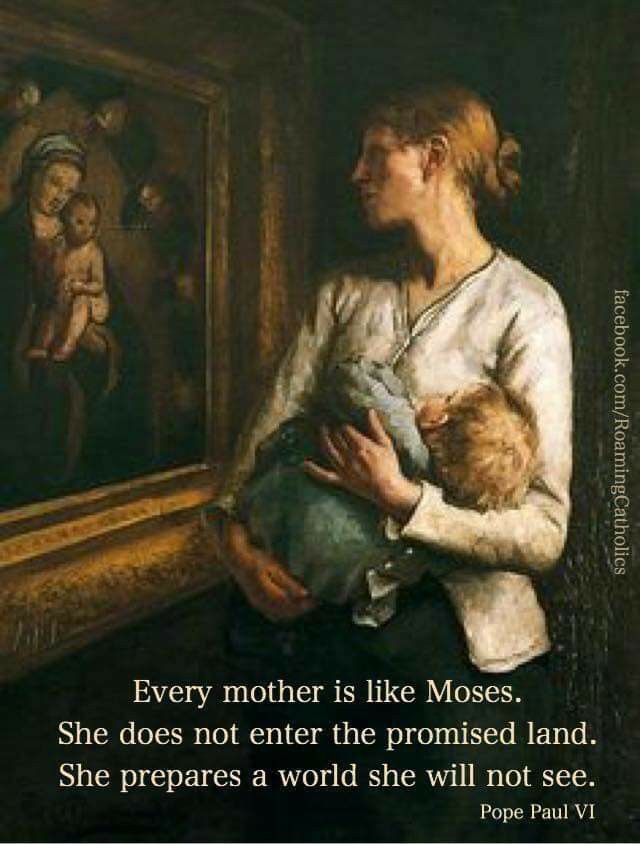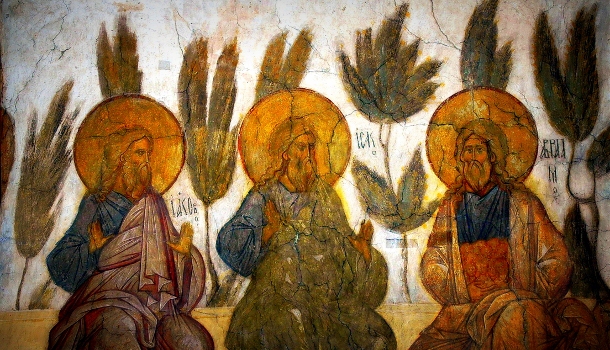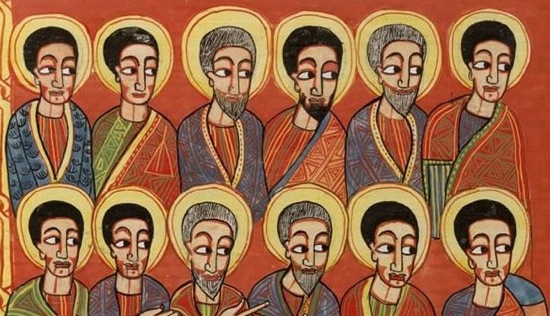Mother Moses

"We are travellers…not yet in our native land" – St. Augustine


The other day I was at the pub discussing theology with one of my friends. During our discussion, I referred to “the New Exodus”, a phrase which he hadn’t heard before. I can’t say for sure, but I think I first heard it used by either Brant Pitre or Scott Hahn…someone like that…
Actually, if you listen to other theologians at the St. Paul Center for Biblical Theology, you’ll hear them use the word “new” an awful lot. They speak about the New Moses, New Manna, New Solomon, New Temple… In light of this, today I would like to give a brief overview of this way of viewing Scripture, with particular reference to the New Exodus. Understanding this perspective on Scripture can be really helpful, particularly in seeing the overarching unity of Scripture in the Old and New Testaments.


I’ve recently started studying the first five books of the Bible in more depth. Almost as soon as I started, I had an “Oh, I never knew that!” moment which is the subject of today’s post.
The opening books of the Bible are known by the Greek word “Pentateuch”, which literally means “five volumes”. Unsurprisingly, there are five books which make up the Pentateuch:
1. Genesis
In Greek, “Genesis” means “Beginning”, which is an appropriate title for this book since it describes the Creation of all things. It also covers the lives of the early Patriarchs, up until the time of Jacob and the Twelve Tribes.
2. Exodus
The second book of the Bible describes the escape of the Children of Israel from Egypt and the giving of the Ten Commandments on Sinai. This is reflected in the book’s title, which literally means “Departure”.
3. Leviticus
If you’ve ever tried to read Leviticus, you’ll know that it goes into great detail concerning all the different sacrifices in the cultic worship of Israel. This worship was performed in the Temple by the priestly tribe of the Levites, which gave rise to the this volume’s title, “Book of the Levites”.
4. Numbers
This book recounts the events of Israel’s sojourn in the desert. Unlike the other volumes in the Pentateuch, its title is not very descriptive, being so named because the opening pages of the book concern a census that was taken among the people.
5. Deuteronomy
The final volume in the Pentateuch contains the Law given by Moses on the plains of Moab prior to his death and before the entry into the Promised Land.
My first “Oh, I didn’t know that!” moment was when I found out the meaning of this book’s title. The Greek word for “Law” is “nomos” and it’s the word used throughout the New Testament to refer to the Law of Moses. You can see this Greek word hidden away in the name of the book: “Deuteronomy“. The prefix, “deutero” means “second” (e.g. “deuterocanon” means “second canon”). Therefore, “Deuteronomy” means “Second Law”. It is so called because it’s the second major piece of legislative material in the Books of Moses.
I previously knew that the Jewish people often refer to the Pentateuch as “The Torah”, the Hebrew word for “Instruction”, “Teaching”, or “Law”. However, what I didn’t know was that the they have different names for each of these books. The names which I listed above (Genesis, Exodus, …) come from the Septuagint (LXX), the Greek translation of the Pentateuch sometime around 250 BC. Within Judaism, however, the following Hebrew names are used:
1. Bereshith (“In the Beginning”)
2. Shemuoth (“Names”)
3. Wayiqra (“And he said”)
4. Bamidbar (“In the desert”)
5. Debarim (“Words”)
As you might be able to guess from the translations in parentheses, the Jews follow the same naming convention used in Catholic Papal Encyclicals, naming the book after the opening words of the document.
Well, that’s enough nerding out for one day… 🙂
Continuing in my series of brief apologetic responses, today I would like to look at the subject of Saintly intercession. As I mentioned last time, these will not be thorough, nuanced rebuttals, but simply how I typically would reply when I only have a brief window of opportunity to respond to objections to my Faith.
I often see on internet forums the following common objection to Saintly intercession:
“You can’t pray to dead people”
In response to this objection I point out that the Saints are not dead:
“…have you not read what was said to you by God, ‘I am the God of Abraham, and the God of Isaac, and the God of Jacob’? He is not God of the dead, but of the living.” – Matthew 22:32
If Jesus says that the Saints (“Abraham…Isaac….Jacob”) are alive and well, then I think it’s pretty safe to assume that they are indeed alive. Last week we had the Feast of the Transfiguration when Jesus speaks with Moses…a “dead” man (Matthew 17:1-4). Therefore, it is incorrect to call those Christians who have passed away “dead”. They are more alive in God than they have ever been!

In Scetis a brother was once found guilty. They assembled the brothers, and sent a message to Moses telling him to come. But he would not come. Then the presbyter sent again saying, “Come for the gathering of monks is waiting for you.” Moses got up and went. He took with him an old basket which he filled with sand and carried it on his back. They went to meet him and said, “What does this mean, abba?” He said, “My sins run out behind me and I do not see them and I have come here today to judge another”
– De vitis Patrum, Sive Verba Seniorum, Liber V
I mentioned a couple of times last year that I was leading a Bible study working through the Acts of the Apostles. During that time, Paul Pavao over at The Rest of the Old, Old Story was writing a series of posts working through books of the Bible (he was also recently recently kind enough to advertise this blog).
When my Acts of the Apostles Bible study was just beginning, Paul wrote a post about the Council of Jerusalem which is found in Chapter 15 of Acts. The Council of Jerusalem was the first recorded council of Church. The apostles and elders of Jerusalem were called together to respond to an issue concerning the Gentile converts to Christianity. Did a Gentile convert need to be circumcised? Did he have to become a Jew before he could become a Christian?

At the Council there was extended discussion around the issue before Peter stood up and affirmed that the Gentiles did not need to be circumcised. St. James then said:
Therefore my judgment is that we should not trouble those of the Gentiles who turn to God, but should write to them to abstain from the pollutions of idols and from unchastity and from what is strangled and from blood. – Acts 15:19-20
In his blog post, Paul wrote:
“The council decides that they will ask just four things from the Gentiles, and they make it clear that circumcision is not necessary for the Gentiles. There may be people who understand why those specific four things were chosen, but I’m not one of them.”
In the comment section of the article I offered my two cents, saying:
“I’ve always seen the requirements from the Council of Jerusalem as measures to ease tensions between Jews and Gentiles in the Church.
“If I was a lifelong Jew who subsequently recognized Jesus as the Messiah I may find it hard to get used to the relaxed restrictions of the New Covenant. I may be a little sensitive about it, so if my gentile brothers and sisters could refrain from consuming strangled meat, food sacrificed to idols and blood, it would be far more likely that family harmony would be maintained.
“Just a thought”
As my own Bible study progressed towards Acts 15, I had the opportunity to do a little bit of research looking at this question and to dig into it a little more…